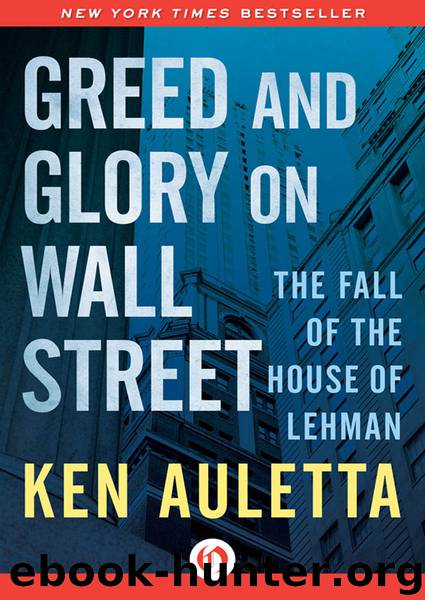Greed and Glory on Wall Street by Ken Auletta

Author:Ken Auletta
Language: eng
Format: epub
ISBN: 9781504018609
Publisher: Open Road Media
* Lipper sought, and lost, the Democratic nomination for New York City Council President in September 1985.
*The New Yorker, September 8 and September 15, 1956.
*Several guests confirm this exchange.
Beginning in July the operating committee, under Glucksman’s direction, met to recommend that year’s bonuses. The six members of the operating committee, in addition to Glucksman, were Bob Rubin; Jim Boshart; Shel Gordon; Dick Fuld; and bankers François de Saint Phalle and Roger Altman. In turn, operating committee bonuses were determined by Glucksman, Rubin, Harvey Krueger, William Morris and Peter Solomon—members of the now defunct executive committee. Traditionally, the CEO at Lehman had the power, if there were disagreements, to make final decisions about the size of a partner’s bonus, including the size of the bonus of all seven members of the operating committee; in consultation with the board, he decided what percentage of the firm’s common shares (then showing a book value of $640.19 per share) each partner was entitled to.
Dividing into subcommittees, the operating committee that summer interviewed individual partners, allowing each to make a case for how much business he had brought to Lehman that year; the full committee, after receiving the recommendations of department heads, reviewed these recommendations with the CEO, and then gave its sanction to the board.
By mid-September, bonus decisions were set. Division chiefs would meet individually with their employees to relay the verdict. Despite the style of living many partners enjoyed and the ample fees Lehman was billing (merger and acquisition fees alone totaled $56 million for the fiscal year ending September 30, 1983) partners’ salaries were relatively modest, ranging at the time from $75,000 to $125,000 annually for all but Glucksman, who received $225,000, and board members, who received $150,000. Bonuses were not modest. Whereas salary and bonuses totaled an average of $166,000 in 1974 and $196,000 the next year, at least half of which was salary, by the 1980’s bonuses ranged from two to ten times salary. In 1982, to take an extreme example, Dick Fuld, then thirty-six, received a bonus of $1.6 million. Not surprisingly, partners did not take bonus or stock decisions lightly.
Bonus expectations were high among the partners, and not without reason. It had been a good year on Wall Street, with bullish trading activity swelling profits. At rival Salomon Brothers, John H. Gutfreund, the managing partner, earned $2.08 million in 1983. Lehman partners knew that executive compensation was up throughout the nation. That year, for example, the president of Apple Computer, John Sculley, earned $1.8 million; the CEO of Paramount Studios, Barry Diller, received $1.7 million. And Lehman partners knew this had been another spectacular year at Lehman, with profits climbing to $147.7 million (before taxes and bonuses). The pool of money set aside for bonuses jumped from $20.6 million in 1982 to $27 million in 1983. Most divisions, including banking, bettered their budgeted projections for the year.
Therefore, when word of the final bonus and stock decisions rumbled through Lehman’s corridors, banking partners wailed. For years they had been
Download
This site does not store any files on its server. We only index and link to content provided by other sites. Please contact the content providers to delete copyright contents if any and email us, we'll remove relevant links or contents immediately.
| Analysis & Strategy | Bonds |
| Commodities | Derivatives |
| Futures | Introduction |
| Mutual Funds | Online Trading |
| Options | Portfolio Management |
| Real Estate | Stocks |
Pioneering Portfolio Management by David F. Swensen(5599)
Rich Dad Poor Dad by Robert T. Kiyosaki(5140)
How To Win Friends and Influence People by Dale Carnegie(3763)
The Money Culture by Michael Lewis(3276)
The Dhandho Investor by Mohnish Pabrai(3161)
The Wisdom of Finance by Mihir Desai(3069)
Liar's Poker by Michael Lewis(2805)
The Intelligent Investor by Benjamin Graham Jason Zweig(2594)
The ONE Thing by Gary Keller(2512)
Mastering Bitcoin: Programming the Open Blockchain by Andreas M. Antonopoulos(2504)
Investing For Dummies by Eric Tyson(2467)
How to Day Trade for a Living: Tools, Tactics, Money Management, Discipline and Trading Psychology by Andrew Aziz(2434)
Rich Dad Poor Dad: What The Rich Teach Their Kids About Money - That The Poor And Middle Class Do Not! by Robert T. Kiyosaki(2432)
How to Win Friends and Influence People by Dale Carnegie(2431)
Fooled by Randomness: The Hidden Role of Chance in Life and in the Markets by Nassim Nicholas Taleb(2407)
Zero Hour by Harry S. Dent Jr. & Andrew Pancholi(2240)
Market Wizards by Jack D. Schwager(2155)
Rich Dad's Guide to Investing by Robert T. Kiyosaki(2104)
How to Pay Zero Taxes, 2018 by Jeff A. Schnepper(2094)
